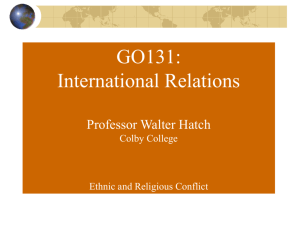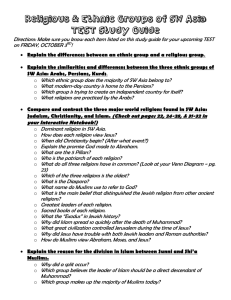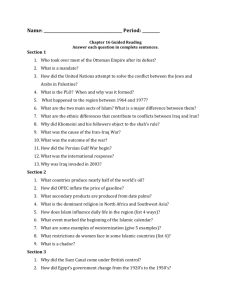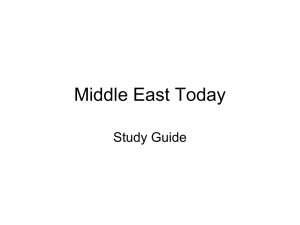Decolonization - wilsonworldhistory1213
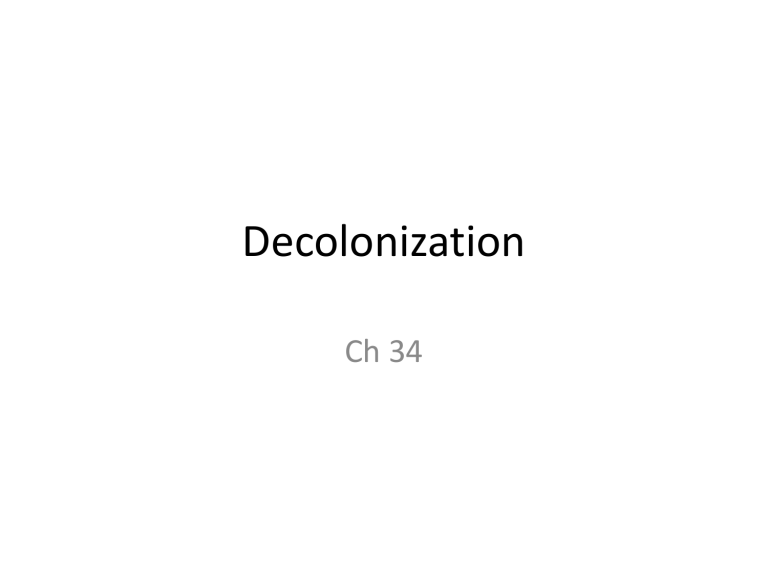
Decolonization
Ch 34
India
Section 1
Congress Party
• Who: Hindus & Muslims
• What: India’s national political party
• Where: India
• When: 1940s
• Why: India had 350mill Hindus & 150 mill
Muslims; most of Congress party were Hindu, but some Muslim; advocated for independence against GB & fought for Indian interests
Mohandas Gandhi
• Who: leader of the Congress party
• What: launched the 1 st nonviolent campaign for independence
• Where: India
• When: 1920s
• Why: his ideas inspired Indians of all ethnic, religious backgrounds to achieve independence; he puts the thoughts of independence in Indians’ heads; a Hindu who doesn’t like his peacefulness b.n Hindus & Muslims extremist assassinated him in 1948
1. What were the major concerns of the Muslim league?
• They thought that the mainly Hindu Congress party looked out primarily for Hindu interests, not Muslim interests
• Wanted to ensure a safe & secure region for
Muslims
Muslim League
• Who: Muhammad Ali Jinnah, Indian Muslims
• What: an organization founded to help protect
Muslim interests; rival group to the Congress party
• When: 1906
• Where: India
• Why: they felt the Congress party only looked out for the Hindus; they stated they would never accept independence if it meant rule by the
Hindu-dominated Congress party
2. What problems had to be resolved in the months prior to independence?
• Division of India- who should be in power?
How should we divide the land? Where would ppl go and how would the gov’t be run?
Partition
• Who: British officials, Muslims & Hindus
• What: the term given to the division of India into 2 separate Hindu and Muslim nations
• Where: India & Pakistan
• When: 1946
• Why: British officials were convinced that partition was the only way to ensure a safe region; the NW & Eastern regions of India where most Muslims lived = Pakistan
3. What were the terms of the cease fire?
• 1/3 of Kashmir under Pakistan control & the rest under Indian control
4. How did Nehru contribute to India’s modernization?
• He led new independent nations in neutral alliances
• He industrialized
• Pushed for social reform
• Expanded human & women’s rights
Jawaharlal Nehru
• Who: Prime Minister
• What: the independent nation of India’s first Prime
Minister
• Where: India
When: 1947-1964
• Why: he was one of Gandhi’s devoted followers; he led other newly independent nations of the world in following an alliance of countries that were neutral in the Cold War; he pushed for industrialization & sponsored social reforms; he tried to elevate the lower castes; his death left the
Congress party w. no strong leader= divisions in
India
5. What events led to the creation of
Bangladesh?
• E. Pakistan was hit by huge tidal wave
• W. Pakistan didn’t transfer aid quickly enough
• Demonstrations broke out-
• Civil war in Pakistan
• 2 separate nations
6. What major problem did Indira
Gandhi face?
• Disarming the Tamil rebels
• Challenges from Sikh extremists that wanted to be an independent state
Indira Gandhi
• Who: Nehru’s daughter, Prime minister
• What: took control of India after her father died
• Where: India
• When:1966-1984
• Why: she faced many threats from Sikh extremists & other political factions throughout
India; sent Indian troops to overrun Golden
Temple= killed 500 sikhs & destroyed sacred property = assassinated by Sikhs in 1984
7. What was the cause of turmoil in Sri
Lanka?
• Group of militant Tamils fought for their own country of Tamil
Benizir Bhutto
• Who: Bhutto’s daughter; Prime minister
• What: took over Pakistan after her father was executed
• Where: Pakistan
• When: 1970s- 1996
• Why: she was removed from office by a military coup = the military rules Pakistan = continues to struggle w. challenges from
Muslim militants & ongoing disputes w. India
Southeast Asia
Section 2
Bell Act
• Who: Americans & Filipinos
• What: established free trade b.n US & the
Philippines
• Where: Philippines
• When: 1960s
• Why: this est. & had to be passed b4 the US would pay the $620million in war damages it promised to the Philippines; Filipinos were worried that this would allow US to exploit their resources- but they passed it anyway
a. Why did the Filipinos object to this act?
• Filipinos were worried that this would allow
US to exploit their resources
b. Why did they agree to sign it?
• To have free trade w. the US & get the $$ the
US promised them
Why did the US demand a long lease on it’s military and naval bases in the
Philippines?
• To maintain military presence in Asia w. the start of the Cold War
• To get valuable resources
Ferdinand Marcos
• Who: President of the Philippines
• What: President who imposed an authoritarian regime & stole billions of $$ from Philippines
• Where: Philippines
• When: 1965-1986
• Why: stoles millions of $$ from public treasury; limited to 8 years of presidential office but imposed a law to keep power; an election brought
Corazon Aquino who challenged him- he refused to acknowledge her victory = the public overthrew him =he fled to Hawaii & died
3. Why does the Philippines restrict the Pres. To a single term?
• To prevent the abuse of power that occurred under Marcos’ rule
Corazon Aquino
• Who: Benigno Aquino’s widow, opponent to Marcos
• What: challenged Marcos to presidency of Philippines
& won
• Where: Philippines
• When: 1986
• Why: she won the presidency decisively- Marcos refused to acknowledge it- he made a law to stay in power = ppl were mad = kicked him out & made her president; promised a more open & democratic form of gov’t; ratified a new constitution; ended the lease on US bases thru negotiation
4 A. What role did General Ne Win play in Burmese history?
• Set up a military gov’t w. a goal to make a socialist state
4B. What role did National League for
Democracy play in Burmese history?
• They won 80% of the seats in the 1990 election- but the military gov’t denies it
• = the military gov’t stayed in charge in Burma
Aung San Suu Kyi
• Who: daughter of Aung San, leader of National
League for Democracy
• What: was active in Nat’l League for Democracy
• When: 1988-2003
• Where: Burma, Southeast Asia
• Why: for her pro-Democracy activities she was put on house arrest 2 separate times = left many
Burmese residents doubting whether their country will ever accept democracy; military gov’t remained
5A. What’s the current political status of Singapore?
• Independent city-state
5B. What’s the current political status of Malaya? Sarawak & Sabah?
• United into a federation of what’s called
“Malaysia”
Sukarno
• Who: Indonesian President
• What: led the effort to establishing an independent
Indonesia
• Where: Indonesia
• When: 1949
• Why: he proclaimed Indonesia’s independence from Netherlands & named himself president; a guerilla army backed him up; the Dutch attempted to regain control but after losing support of the US the Dutch gave Indonesia it’s independence
Suharto
• Who: General Suharto
• What: sought power for himself, began a bloodbath in which 500,000 to 1 mill Indonesians were killed
• Where: Indonesia
• When: 1965-1998
• Why: named President in 1967; turned Indonesia into a police state; heavily criticized; little tolerance for religious freedoms; bribery & corruptioncommonplace; economy improved for awhile BUT gov’t repression & economic crisis = forced him to step down= then they moved towards Democracy
6. What factors finally forced Suharto to step down?
• Growing unrest over both Gov’t repression & a crippling Economic crisis
Negritude Movement
• Who: Africans & W. Indians
• What: a movement to celebrate African culture, heritage, & values
• Where: Africa
• When: 1950-1960s
• Why: the Africans pushed for independence in the decades b4 WWII; French speaking Africans & W.
Indians began to express their growing sense of black consciousness & pride in traditional African; when WWII broke out African soldiers fought w.
Europeans = after the war, they were unwilling to accept colonial domination
1. Ghana
• Tactics used by Nkrumah: organized strikes & boycotts
• Nkrumah’s reforms: new roads, schools, & expanded health facilities; Industrialization
• Problems: spending too much time on African efforts & the expense of his programs undermined the economy
Kwame Nkrumah
• Who: Ghana’s first Prime minister & president for life
• What: leader of Ghana’s nonviolent movement for freedom
• Where: Ghana, West Africa
• When: 1947-1966
• Why: He worked to liberate Ghana from the British; he organized strokes & boycotts = ultimately, they got independence; he became leader of Ghana; pushed for new roads, schools, health facilities, industrialized & gave welfare = his programs were too $$ = crippled
Ghana’s economy= the army & police took control & kicked him out of power
2. Kenya
• Tactics used by Mau Mau: Guerilla warfare
• Kenyatta’s reforms: unite countries of various ethnic & language groups
• Problems: killed hundreds & left 1000s homeless; corruption & ethnic conflicts
Jomo Kenyatta
• Who: African revolutionary; Kenyan
Nationalist & president
• What: promoted his beliefs & was put in jail
• Where: Kenya, Africa
• When: 1891-1978
• Why: got independence for Kenya; became president; united many ethnic groups; after he died- no one was as successful at governing the country
3. Zaire
• How independence was gained: Belgium gave it to them & then Mobutu seized power
• Mobutu’s rule: maintained control through force; 1 party rule; gifts to supporters; overthrown
• Problems: overthrown by a rebel leader; constant civil wars; promise of Democracy never fulfilled
4. Algeria
• How was independence gained: Algerian
National Liberation Front (FLN) sent ½ mill soldiers to fight against French colonists
• Ben Bella’s programs: attempted to make a socialist state
• Problems: overthrown by his army commander; unemployment; dissatisfaction w. the govt
Ahmed Ben Bella
• Who: leader of FLN & president of Algeria
• What: became first president of newly independent Algeria
• Where: Algeria, Africa
• When: 1962-1965
• Why: He attempted to make Algeria a socialist state; overthrown in 1965 by his military commander
5. Angola
• How independence was gained: fighting & an independence movement against Portugal
• Causes of Civil war: Communist- Leaning
MPLA declared itself the new nation’s rightful govt = rebel groups fought for power = civil war
• Other problems: various rebel groups fought for power; abandoned case-fire agreements = continued war
Middle East
Section 4
1. Britain issues the Balfour declaration
• Causes: Sir Arthur Balfour promoted the idea of creating a Jewish homeland in Palestine
• Effects: hostility between Palestinians & Jews continued to grow
2. Independent Israel is created
• Causes: The UN voted for a partition of
Palestine into a Palestinian state & a Jewish state
• Effects: the new nation of Israel got a hostile greeting from it’s neighbors- the day after it proclaimed itself a state- six Islamic states (
Egypt, Iraq, Jordan, Lebanon, Saudi Arabia, &
Syria) invaded Israel = Arab-Israeli war
3. The 1956 Arab-Israeli war breaks out
• Causes: Israel became an independent nation
& 6 Islamic states invaded; Israel claimed lands that Arabs felt should have exclusively been Arab
• Effects: 1956 Suez crisis occurred which led to
Israel & Europe withdrawing from Egypt; the expansion of Israeli boundaries
4. 1967 6 day war began
• Causes: Arabs were about to attack w. Soviet help; Israelis were convinced the Arabs were about to attack so they struck airfields in surrounding Islamic countries
• Effects: Israel defeated Arabs & Arabs lost
15000 ppl
Anwar Sadat
• Who: Egyptian president
• What: planned a joint Arab attack on Yom Kippur
(Jewish holiday)
• Where: Egypt
• When: 1973
• Why: the Israelis were caught by surprise; Arab forces inflicted heavy casualties and recaptured some of their territory lost in 1967; both sides agreed to a truce several weeks after fighting; 1977-he stunned the world by extending a hand to Israel- the first Arab country to do so =historic opportunity for peace; signed the Camp
David Accords= ended 30 years of hostility
Golda Meir
• Who: Israel’s prime minister
• What: launched a counter attack against Egypt
(Arabs, Anwar Sadat) in the Yom Kippur War
• Where: Israel
• When: 1967
• Why: he regained territory they had lost to
Egpyt; agreed to a truce w. Anwar Sadat
5. The 1973 Yom Kippur war begins
• Causes: conflicts b.n Arabs & Jewish Israel
• Effects: Israel regained territory it had lost previously; Egypt & Israel signed a truce
PLO
• Who: Palestinians
• What: Palestine Liberation Organization
• Where: Palestine
• When: 1964
• Why: this organization pushed for the formation of a Palestinian state; made up of different groups- guerilla fighters, laborers, teachers, etc. ; guerillas took over the organization and said the only way to get what they wanted was through armed struggle
Yasir Arafat
• Who: chairman of PLO
• What: his group carried out numerous attacks against Israel in order to form their own
Palestinian state
• Where: Israel & Palestine
• When: 1960s, 1970s
• Why: his attacks on Israel & Arabs gave
Palestine it’s own state
6. Sadat & Begin sign the Camp David
Accords
• Causes: Arabs wanted permission to nuke
Israel; Israel wanted Egypt to recognize them as their own independent state
• Effects: ended 30 years of hostilities b.n Egypt
& Israel and became the first signed agreement b.n Israel & an Arab country
Camp David Accords
• Who: Jimmy Carter, Sadat, & Begin
• What: a signed agreement
• Where: Camp David, USA
• When: 1978-1979
• Why: ended 30 years of hostilities b.n Egypt &
Israel and became the first signed agreement b.n Israel & an Arab country
